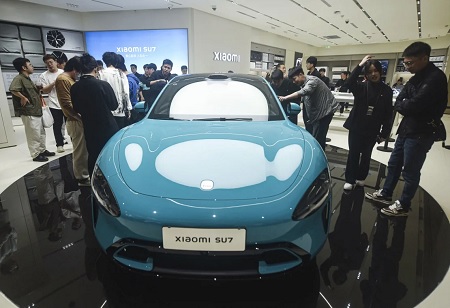
China's Xiaomi enters the EV race with a sedan priced under $30,000

 Xiaomi has officially debuted its highly anticipated electric vehicle, the new Speed Ultra 7 (SU7) sedan, in Beijing. Lei Jun, the founder and CEO of the renowned Chinese smartphone brand, announced that the company's inaugural electric car will be priced between 215,900 yuan ($29,874) and 299,900 yuan ($41,497) in China. This starting price is approximately $4,000 lower than Tesla's Model 3 sedan, which begins at 245,900 yuan in the Chinese market.
Xiaomi has officially debuted its highly anticipated electric vehicle, the new Speed Ultra 7 (SU7) sedan, in Beijing. Lei Jun, the founder and CEO of the renowned Chinese smartphone brand, announced that the company's inaugural electric car will be priced between 215,900 yuan ($29,874) and 299,900 yuan ($41,497) in China. This starting price is approximately $4,000 lower than Tesla's Model 3 sedan, which begins at 245,900 yuan in the Chinese market.
Earlier this week, Lei had hinted at the launch by expressing his desire for the SU7 to be positioned as the "most attractive, effortlessly drivable, and technologically advanced car" priced below 500,000 yuan ($69,180). “Xiaomi wants to build a ‘dream car’ comparable to Porsche and Tesla”, he said. “If we want to build good cars, we must seriously learn from these two best car manufacturers in the world”, he added.
Xiaomi had previously stated its aim to attract premium consumers with the new car. The pricing strategy positions it competitively against foreign competitors. For instance, an imported Porsche Taycan begins at 898,000 yuan ($124,248) in China, while Tesla's Model S, the premium electric sedan from the US manufacturer, starts at 698,900 yuan ($96,700). In China, electric vehicles are generally priced much lower compared to the global market. As an example, BYD's most affordable model, the Seagull hatchback, is priced at only 69,800 yuan ($9,658).
Lei mentioned that the standard edition of Xiaomi's SU7 boasts a starting range of 700 kilometers (435 miles), surpassing the long-range variant of Tesla's Model 3. Xiaomi announced that orders for the car had surpassed 50,000 units within just 27 minutes of sales commencement in Beijing. “My excitement today can’t be described in words”, Lei said on Thursday night.
According to a video shared by the company, the launch event of Xiaomi saw the presence of founders and CEOs from various Chinese EV manufacturers, such as He Xiaopeng of XPeng Motor, William Li of Nio, and Li Xiang of Li Auto. Xiaomi's significant aspirations in the automotive sector coincide with a period of fierce competition within the Chinese industry. The world's largest EV market, driven by substantial state subsidies over the past decade, has now become saturated.
At present, over 200 prominent manufacturers are engaged in the production of pure electric vehicles (EVs) and plug-in hybrids. In response to diminished consumer demand, a price competition emerged last year as companies sought to bolster sales. Official statistics indicate that average profit margins dwindled to a mere 5% in 2023. BYD, the leading player in the industry, announced earlier this week that its quarterly profit growth had reached its lowest point in two years due to a loss of momentum in sales.
According to Lei, Xiaomi's SU7 has been showcased in showrooms across 29 cities in mainland China since Monday. Xiaomi, renowned for its production of smartphones and other consumer electronics, captured 13% of both global and Chinese smartphone sales in the final quarter of 2023, as reported by Counterpoint Research. It secured the fifth position in China for the entire year.

